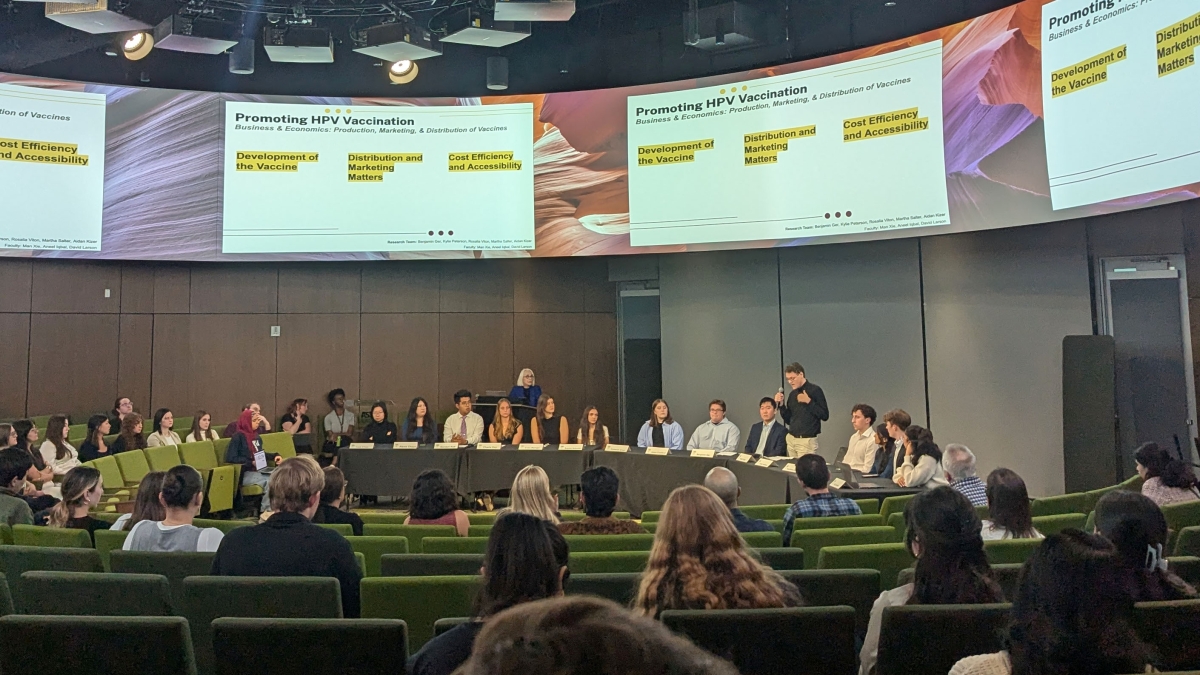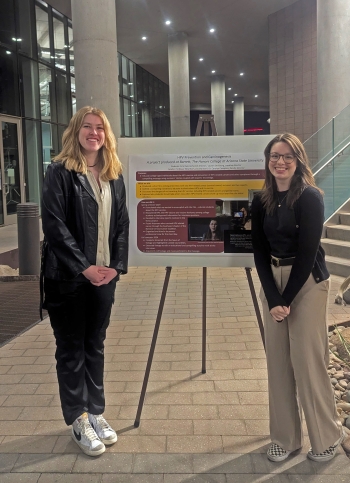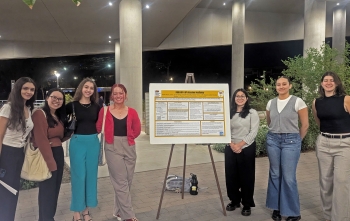ASU honors students work on HPV research as part of Barrett College's largest-ever group thesis

Students representing their sub-teams in the ForkHPV! group speak at the HPV symposium on Oct. 29. Courtesy photo
Not every undergraduate student comes across the opportunity to do research as part of a team. Even fewer have had the chance to join a team of 86 students doing multidisciplinary research with real-world impacts.
The members of ForkHPV!, a network of students from Barrett, The Honors College, are lucky enough to say they have.
The ForkHPV! group is out to save lives, and they’ve had a long-term plan for how they’re going to do it: educating people and getting them vaccinated against HPV, or human papillomavirus, a potentially cancer-causing disease spread through skin-to-skin contact.
The work the students have done for the past year and a half will culminate in a universitywide HPV vaccination event, which students can sign up for through the ForkHPV! website. The event will take place on Nov. 14.
“These students aren’t just doing work that could save lives down the line; they are going to save lives,” said Carolyn Compton, the director of ForkHPV!, at the project’s symposium on October 29.
Compton is a professor in the School of Life Sciences, where she teaches an undergraduate course on cancer. She also served as the medical director of the ASU Biodesign Clinical Testing Laboratory for many years, but recently stepped down from that position to help set up ASU’s new medical school.
Compton previously organized a similar project with 30 Barrett students around COVID-19. But ForkHPV! is even bigger and more ambitious, gathering nearly triple the number of students to study a disease from a wider variety of angles.
“I work every day with hundreds of young people who are exactly the right age to be getting the prevention vaccine,” Compton said.
As part of nine sub-teams, each student helped research different social, legal and medical aspects of the virus — from the transmission dynamics of the virus, the treatment of cancers caused by the virus and the gender disparities behind who tends to get vaccinated.
One team was solely dedicated to public education and outreach to promote the vaccination event.
Cassie English, a marketing and business data analytics major, explains that the team spent the past year researching students’ perspectives and knowledge of HPV and the HPV vaccine, and used the data from that research to shape their approach to promoting the vaccination event.
English hopes to work in a marketing analytics role after graduating, which she feels better prepared for after working with ForkHPV!.
“I am very passionate about data-driven decision-making," she said. "Getting to work firsthand on a marketing strategy ... to drive the most vaccination appointments possible ... deeply expanded my understanding of real-world applications.”
Tyler Struver, a biology major on the sub-team studying vaccine hesitancy, as well as one of the logistics coordinators for the vaccination event, shares that this experience further motivated her to pursue medical school after graduating.
“I was able to see and participate in the kind of change that ignited my goal to become a physician, all while connecting with an inspiring group of students and faculty dedicated to sharing their knowledge and improving the health and wellness of our community,” she said.
Each student’s research is also counting as their Barrett thesis, which most of the group members will be defending in the next month.
The undergraduates’ work does not end with their thesis defense, though. Each sub-team is also writing a chapter of what will eventually become a published book for interested members and for those at other universities who might be interested in setting up a vaccination program of their own.
“If we’re successful, I’m hoping other universities will do the same thing,” Compton said. “I hope ASU is a template for success.”
More Health and medicine
New Indigenous health dashboard offers robust database for scholars
By Nicole Greason and Kimberly Linn A team at Arizona State University’s College of Health Solutions and American Indian Studies program has created a new tool to aid researchers…
College of Health Solutions program doing its part during Salute to Service
It wasn’t always easy for Marine veteran Chuck Hale when he first returned to civilian life. But he’ll never forget the help he received from a fellow former service member.“The first vet that helped…

What makes human culture unique?
Why is human culture — the shared body of knowledge passed down across generations — so much more powerful than animal cultures?“What’s special about our species?” is a question scientists have…

